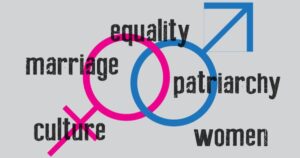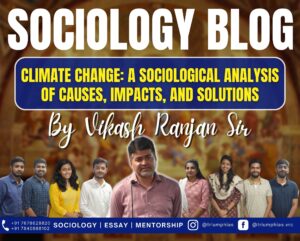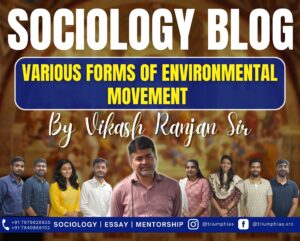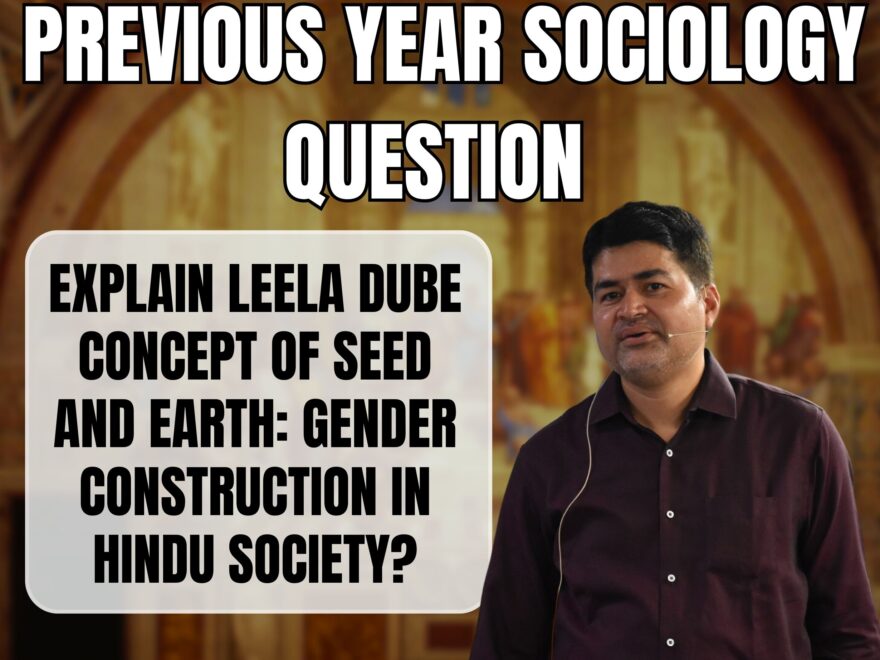Explain Leela Dube Concept of Seed and Earth: Gender Construction in Hindu Society?
(Paper: 2, Section- A, Year 2022, Unit 12: Social Structure – Systems of Kinship in India)
| Introduction: Basic Idea of Leela Dube’s Seed and Earth and Her Ideas About Gender Studies
Main body: Detailed Analysis of Seed and Earth Conclusion: Relevance of Leela Dube’s Approach to Study Gender. |
Explain Leela Dube Concept of Seed and Earth: Gender Construction in Hindu Society?
(10 Marks)

Introduction of the Answer
- Leela Dube’s concept of “Seed and Earth” is a pivotal element in her exploration of the construction of gender in Hindu society, particularly focusing on the upbringing and socialization of girls.
- In her work, “On the Construction of Gender: Hindu girls in Patrilineal India,” Dube delves into how gender identities are formed and maintained through rituals, language, and family practices.
- Her analysis is grounded in the context of Hindu culture, with a particular emphasis on her own experiences and observations as a woman in this society.
Main Body of the Answer
Lila Dube’s Methodological Approach:
- Lila Dube’s approach to studying gender and kinship was groundbreaking for its interdisciplinary nature, as she merged insights from anthropology and women’s studies.
- She employed the “comparative method” often used in anthropology to draw insights from diverse cultures, enabling her to shed light on the status and roles of women within the Hindu context.
- By bridging these disciplines, she contributed significantly to the development of gender and kinship studies in India.
“Seed and Earth” Analogy:
- At the heart of Dube’s analysis is the “Seed and Earth” analogy, which she employs to illustrate the cultural construction of gender differences.
- This analogy likens women to “Earth,” the passive receptacle that receives and nourishes the “Seed,” symbolizing the active essence provided by men.
- In this metaphor, men are attributed a primary and influential role, while women are depicted as secondary and supportive.
Gender Roles and Family Structures:
- Dube explores how the “Seed and Earth” analogy shapes gender roles within various family structures and kinship systems.
- She explains how these roles influence rules regarding marriage, residence, and the reorganization of families.
- Additionally, she highlights the impact of the caste institution on these dynamics, emphasizing how gender roles are intertwined with social hierarchies.
Language and Idioms:
- To illustrate the engrained secondary status of girls, Dube analyzes the use of language and idioms.
- She draws attention to expressions in different languages that reinforce the perception of girls as less valuable or significant.
- For instance, she cites the Telugu expression “Bringing up a daughter is like watering a plant in another’s courtyard,” which underscores the temporary and expendable nature of a girl’s presence.
Rituals and Puja:
- Dube demonstrates how gender roles are reinforced through rituals and ceremonies, particularly through practices that involve the worship of girls before menarche.
- She discusses customs such as Durga Puja in Bengal and Gauri Puja in Karnataka, where young girls are revered and fed.
- These rituals emphasize the purity and vulnerability of pre-menarche girls, contrasting them with the perceived “dangerous” stage that follows puberty.

Motherhood and Marriage:
- Dube argues that one of the reasons for placing constraints on female sexuality is the societal emphasis on women’s roles as wives and mothers.
- She contends that motherhood is considered the pinnacle of achievement for women, and marriage serves as the gateway to fulfilling this role.
- According to her analysis, this prioritization of motherhood above all else contributes to the subordination of women.
Caste and Violence against Women:
- Dube also introduces the concept of women as gatekeepers of caste, suggesting that they play a role in maintaining the boundaries and purity of the caste system.
- She links this notion to instances of violence against women, positing that perceived transgressions of caste norms can result in severe consequences for women.
Conclusion of the Anwer
In essence, Leela Dube’s “Seed and Earth” concept encapsulates her nuanced exploration of gender construction in Hindu society. Through this analogy and her interdisciplinary approach, she unveils the complex interplay of culture, language, rituals, and family structures in shaping and perpetuating gender inequalities and identities.
Sample Question for UPSC Sociology Optional Paper:
1. Question: Briefly describe Leela Dube’s “Seed and Earth” concept.
- Answer: Leela Dube’s “Seed and Earth” concept likens men to “Seed,” representing active essence, and women to “Earth,” a passive receptacle, to illustrate the cultural construction of gender in Hindu society.
2. Question: How does Leela Dube employ interdisciplinary methods in her study?
- Answer: Dube combines anthropology and women’s studies in an interdisciplinary approach, using the comparative method to shed light on gender and kinship in Hindu society.
3. Question: Explain how the “Seed and Earth” analogy influences gender roles in family structures according to Dube.
- Answer: The “Seed and Earth” analogy establishes men as primary and influential, and women as secondary and supportive, shaping gender roles within family structures, marriage, and kinship systems.
4. Question: How does language contribute to the construction of gender roles in Hindu society as analyzed by Dube?
- Answer: Dube points out idioms and expressions that underscore the secondary status of girls, reinforcing their perceived expendability and lesser value.
5. Question: What role do rituals play in reinforcing gender roles according to Leela Dube?
- Answer: Rituals like Durga Puja and Gauri Puja revere pre-menarche girls for their purity, contrasting them with the “dangerous” stage post-puberty, thus reinforcing traditional gender roles.
Related Blogs
 |
 |

To master these intricacies and fare well in the Sociology Optional Syllabus, aspiring sociologists might benefit from guidance by the Best Sociology Optional Teacher and participation in the Best Sociology Optional Coaching. These avenues provide comprehensive assistance, ensuring a solid understanding of sociology’s diverse methodologies and techniques.
META TAGS:
Leela Dube, Seed and Earth, Gender Construction, Hindu Society, Anthropology, Women’s Studies, Family Structures, Caste System, Rituals, Language, Motherhood, Marriage, Violence against Women, Leela Dube, Leela Dube, Leela Dube,
Why Vikash Ranjan’s Classes for Sociology?
Proper guidance and assistance are required to learn the skill of interlinking current happenings with the conventional topics. VIKASH RANJAN SIR at TRIUMPH IAS guides students according to the Recent Trends of UPSC, making him the Best Sociology Teacher for Sociology Optional UPSC.
At Triumph IAS, the Best Sociology Optional Coaching platform, we not only provide the best study material and applied classes for Sociology for IAS but also conduct regular assignments and class tests to assess candidates’ writing skills and understanding of the subject.
Choose The Best Sociology Optional Teacher for IAS Preparation?
At the beginning of the journey for Civil Services Examination preparation, many students face a pivotal decision – selecting their optional subject. Questions such as “which optional subject is the best?” and “which optional subject is the most scoring?” frequently come to mind. Choosing the right optional subject, like choosing the best sociology optional teacher, is a subjective yet vital step that requires a thoughtful decision based on facts. A misstep in this crucial decision can indeed prove disastrous.
Ever since the exam pattern was revamped in 2013, the UPSC has eliminated the need for a second optional subject. Now, candidates have to choose only one optional subject for the UPSC Mains, which has two papers of 250 marks each. One of the compelling choices for many has been the sociology optional. However, it’s strongly advised to decide on your optional subject for mains well ahead of time to get sufficient time to complete the syllabus. After all, most students score similarly in General Studies Papers; it’s the score in the optional subject & essay that contributes significantly to the final selection.
“A sound strategy does not rely solely on the popular
Opinion of toppers or famous YouTubers cum teachers.”
It requires understanding one’s ability, interest, and the relevance of the subject, not just for the exam but also for life in general. Hence, when selecting the best sociology teacher, one must consider the usefulness of sociology optional coaching in General Studies, Essay, and Personality Test.
The choice of the optional subject should be based on objective criteria, such as the nature, scope, and size of the syllabus, uniformity and stability in the question pattern, relevance of the syllabic content in daily life in society, and the availability of study material and guidance. For example, choosing the best sociology optional coaching can ensure access to top-quality study materials and experienced teachers. Always remember, the approach of the UPSC optional subject differs from your academic studies of subjects. Therefore, before settling for sociology optional, you need to analyze the syllabus, previous years’ pattern, subject requirements (be it ideal, visionary, numerical, conceptual theoretical), and your comfort level with the subject.
This decision marks a critical point in your UPSC – CSE journey, potentially determining your success in a career in IAS/Civil Services. Therefore, it’s crucial to choose wisely, whether it’s the optional subject or the best sociology optional teacher. Always base your decision on accurate facts, and never let your emotional biases guide your choices. After all, the search for the best sociology optional coaching is about finding the perfect fit for your unique academic needs and aspirations.
Follow us :


https://t.me/VikashRanjanSociology
Find More Blogs
|
Scope of the subject and comparison with other social sciences |
|||
|
|
|
|
Modernity and social changes in Europe |

